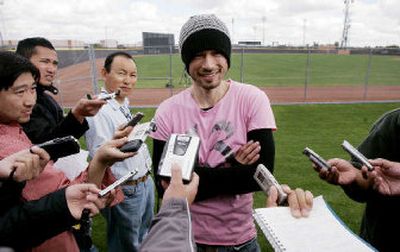Free expressions

PEORIA, Ariz. – Ichiro Suzuki didn’t look particularly imposing. He never does.
Not with his lithe body in prime condition, as usual. Certainly not with a pink T-shirt, black long sleeves, blue jeans with camouflage patches, shiny silver sneakers and black-and-white knit cap all clinging to him like a skateboarding teenager wearing his little brother’s clothes.
Yet Ichiro still imposed his will – and thoughts about free agency – onto the Mariners during his first day of spring training Tuesday. Seattle’s sleek, six-time All-Star and perennial Gold Glove outfielder raised the leverage bar on contract negotiations by saying “it is possible I will go to free agency” after the 2007 season.
Ichiro’s $44 million, four-year deal ends this fall. This is the first time in his professional life with Seattle and with Orix in Japan that he is playing the final season of a contract.
“I’ve played 15 years of professional baseball and I have never filed for free agency. I have never had the choice, to choose for myself which road I want to take,” Ichiro said through interpreter Ken Barron during a 25-minute session with English-language media, after a lengthy session with Japanese reporters.
“So if you ask me is it possible that I will go to free agency, yes, it is possible.”
“But if you ask me what are my feelings toward it, at this point I cannot express it. I am not even sure myself. But what I can say is my mind is full of having the best season possible.”
Ichiro said he does not know if the Mariners have approached his agent, Tony Attanasio, about a new contract. Attanasio did not return a call seeking comment.
“Up to this point, it’s been an easy road,” Ichiro said of always having a future deal. “(Now) what I need to do is make my own decision on something.”
For now, Ichiro has no idea whether he will stay with the only major league team he’s known since Seattle won bidding to sign him out of Japan before 2001.
“I’m not ear-muffing my ears right now. I’m looking and I’m listening, but I don’t know,” he said.
“I like baseball … I know baseball is a job, but to me it’s really closer to a hobby than a job.”
Last Thursday, team chairman and CEO Howard Lincoln would not say how far along the team is in negotiating a new deal with its franchise player.
“We have a team policy not to talk to the media about the status of contract negotiations,” Lincoln told The Associated Press.
“But I will say this, that it’s my hope Ichiro will finish his career as a Mariner – and go into the Hall of Fame as a Mariner.”
Seattle has finished last in the American League West three consecutive times. Ichiro said “the feeling of unhappiness is something you can’t get used to in the world of winning or losing.”
The Mariners added three starting pitchers this winter – Jeff Weaver, Horacio Ramirez and Miguel Batista – plus designated hitter Jose Vidro and outfielder Jose Guillen. Guillen’s arrival in right field is moving Ichiro to center field, where he occasionally played for Orix from 1992-99.
Ichiro said how well those moves work will be one factor in his decision whether to stay or go.
“Everything that was done in the past and has built up to this point is an important part,” he said. “But what happens in the future in this season is important also.”
Mike Hargrove said his experience of 15 seasons as a major league manager has shown that “sometimes” a player is affected by playing with contract negotiations looming.
“A lot of times, no. Players are really good at compartmentalizing things,” Seattle’s manager said. “He understands he’s got a job to do and that affects how (a new contract) turns out in the end.
“Ichiro is a strong-minded person.”
Strength turned against Ichiro during his first spring workout. Left-handed reliever George Sherrill buzzed two high-and-inside fastballs near his head during rare batting practice against live pitching. Ichiro bent his torso away both times, laughing with catcher Rene Rivera after the second one.
Sherrill’s third pitch inside pierced Ichiro’s black bat, part of a cherished collection that is specially cut from Japanese ao damo (blue) trees and stored in a humidity controlled case.
The bat splintered from the barrel to the handle, with the larger piece flying near first base. That created the rare sight of Ichiro holding little more than a wooden knob.
A female fan watching from behind a chain-link fence dashed to retrieve the surprise souvenir for her son, who proudly yelled, “We got a broken bat!” After the woman wrote “2-20-07 Ichiro” in black marker on the whitish inside portion of the fragment and joked about selling it on eBay, a Mariners official approached to ask for it back.
Why? Ichiro wanted to see why it broke, the spokesman said.
Sherrill has pitched the last three seasons for Seattle. He said the meticulous Ichiro doesn’t break many bats.
“Not enough to remember,” Sherrill said, smiling, as if proud of what he’d done.